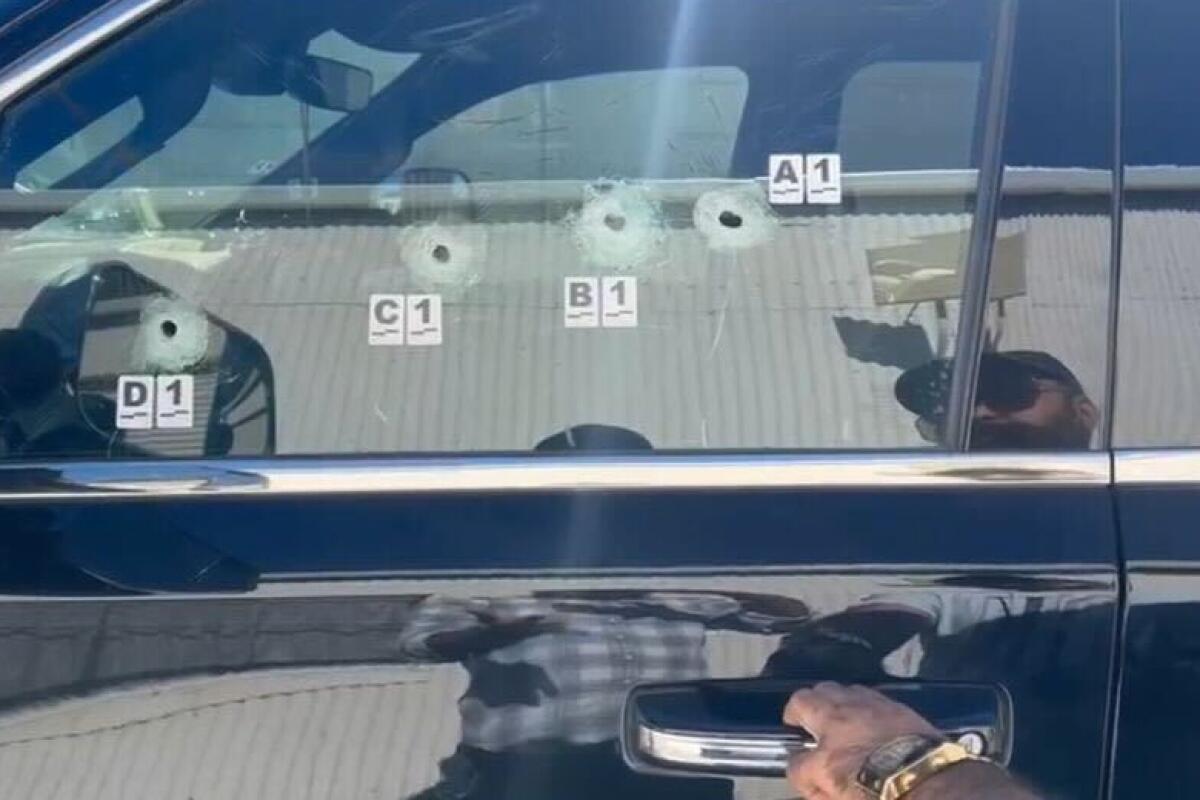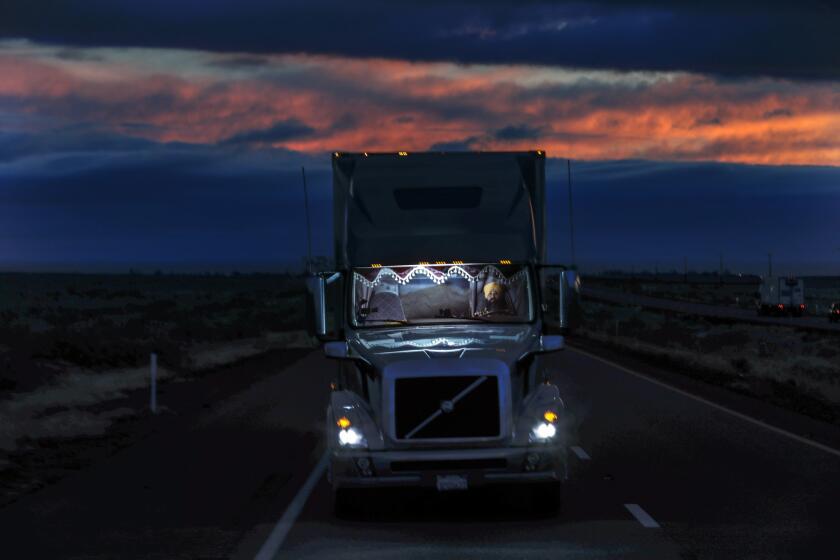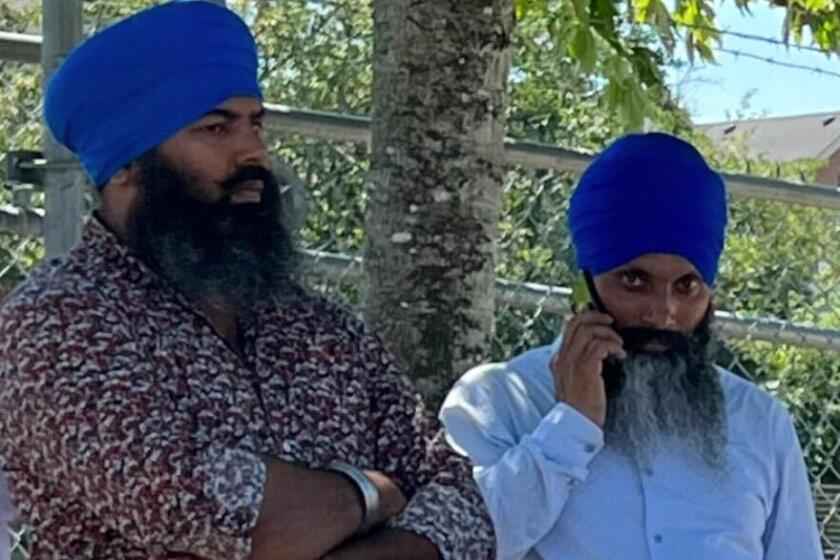Shooting attempt on ‘Khalistan’ activist raises fears among Northern California Sikhs

WOODLAND, Calif. — Until recently, Satinder Pal Singh Raju was a mostly unknown figure in Northern California’s large and sprawling Sikh community.
From his home in the small city of Woodland, he worked as a trucker — a popular job for Sikhs — took care of his wife and kids and was a regular at Gurdwara Sahib West Sacramento, the temple where he’s prayed since emigrating from India nearly 19 years ago.
In his free time, he volunteered to travel Northern California and Canada to organize educational events and symbolic voting drives to establish a long-desired independent nation, Khalistan, that Sikh activists want to carve out of India’s Punjab region. India considers the decades-old global separatist movement to be a terrorist operation because of its territorial ambitions and violence committed by some of its offshoots.
On Aug. 11, when Raju was making a late-night food run with two friends, someone fired at his pickup truck as it traveled down Interstate 505 in rural Yolo County. At least four bullets struck his vehicle, police said. Raju and his friends — who are also Sikh activists involved in the separatist movement — were not injured, although their car veered off the road, coming to rest near a drainage ditch and a two-story stack of hay.
“They tried to kill me,” said Raju, 44.
In the last two weeks, news of the shooting has reverberated across Indian media and Punjabi-language radio shows in North America as fears grow among California Sikhs about recent threats against them because of their political activity in opposition to the right-wing, nationalist Indian government. In recent months, Sikh leaders at several temples across Northern California have reported anonymous calls and text messages that threaten them in Hindi for pro-Khalistan activities.
There has been debate in the Sikh community about whether the attack on Raju and his passengers could be linked to broader transnational incidents in Canada and the U.S. in which authorities have accused the Indian government of being tied to the fatal shooting of a Sikh activist in British Columbia and a plot to kill another in New York.
A Sikh temple in Stockton is a key part of a movement to form a breakaway republic thousands of miles away in India.
India has denied all allegations.
Local law enforcement in Woodland and the California Highway Patrol, which responded to the 911 call, have not commented on the motivation for the shooting and publicly released information about it on Aug. 22, 10 days after the incident. In a statement, the FBI said it “continues to collaborate” with the CHP on an investigation and “takes all acts of violence seriously.” The Indian Embassy in Washington, D.C., did not reply to questions from The Times.
Activists targeted
The Sikh Coalition, a U.S.-based civil rights group, said in a statement that the Yolo County incident, while under investigation, “underscores the continued threat of Indian transnational repression.”
The activists targeted in the Canada and New York cases were involved in a group called Sikhs for Justice. The organization promotes nonbinding referendum votes across the globe for the Sikh diaspora to express support for Khalistan, which means “land of the pure” in Punjabi. Voting events this year in Sacramento and San Francisco attracted tens of thousands of Sikhs.
In May, Canadian police arrested three Indian nationals residing in Alberta in connection with a June, 18, 2023, shooting that killed Sikh leader Hardeep Singh Nijjar — a close friend of Raju’s — as he stood outside his temple.
The three suspects — as well as a fourth alleged associate who was previously arrested — appeared in court this month on charges of first-degree murder and conspiracy to commit murder. The trial was delayed until October. The Royal Canadian Mounted Police — Canada’s national police force — did not disclose how it found the men. Prime Minister Justin Trudeau has said Canadian intelligence agencies were looking into “credible allegations” of possible Indian government involvement.
India has said that Canada has shared no evidence to back its allegations of government involvement. It instead accused Canada of giving “shelter” to extremists.
In November, the U.S. government alleged in a federal indictment that India paid a hit man — an undercover agent connected to the Drug Enforcement Agency, it turned out — to kill a Sikh activist in New York who is a lawyer and spokesman for Sikhs for Justice. In the indictment, the U.S. accused an unnamed Indian official of working with a known international narcotics trafficker to hire the fake hit man for $100,000. The trafficker was arrested in the Czech Republic and extradited in June to New York. He has pleaded not guilty in federal court ahead of a September trial.
India has said its investigation into U. S. charges found that “rogue” agents of the Research and Analysis Wing, India’s spy agency, were operating without government approval.
Sikhs vow to continue
Activists brush off the denials and said they remain unflinching in their commitment.
“They lie,” said Gurpatwant Singh Pannun, a lawyer and spokesman for Sikhs For Justice who has been promoting Raju’s case. Pannun is the New York resident that the U.S. government said India tried to kill.
“If a bullet and death is the price to pay for Khalistan, that is what we will face as Sikhs,” said Pannun, who produces YouTube shows from his Astoria, Queens, office where he rails against Indian Prime Minister Narendra Modi.
He’s now turned his attention toward Raju, who has become somewhat of a hero in the tight-knit community of Sikhs who organize for Khalistan.
For Raju, the shooting has emboldened his activism.
“What more is there but to keep on going?” he said. “We can’t stop now. We can’t be scared.”
Not all of his co-activists agree with Raju’s allegations of a possible Indian plot against him.
“We don’t really know what happened. It could be something else,” said Bobby Singh, a 24-year-old Khalistan organizer in Sacramento who said he knows Raju from local pro-Khalistan rallies. “Still, we demand a full investigation.”
There are 3.5 million truckers in the United States. California has the second-most after Texas. As drivers age toward retirement and a shortage grows, Sikh immigrants and their kids are increasingly taking up the job.
Decades-long strife
Sikhs number about 500,000 in the U.S., the third-largest population outside of India after the United Kingdom and Canada. About half of U.S. Sikhs live in California, where their presence in the Bay Area, Stockton and Sacramento goes back to the late 19th and early 20th centuries.
While the most ardent activists for Khalistan, such as Raju, make up a small group, support for the movement is widespread among Sikhs in the United States. Posters and prayers at temples regularly cite the envisioned Sikh nation.
Many, like Raju, point to modern Indian history as the reason why.
Now 44, he was a young boy growing up in the Punjabi city of Jalandhar during a peak of strife between Sikhs and the Indian government.
In 1984, Indian Prime Minister Indira Gandhi ordered a siege on separatists occupying the Golden Temple in Amritsar, the holiest site in Sikhism. In response, her two Sikh guards assassinated her. Mobs went on a rampage around Delhi, killing Sikhs, often with government approval. Some estimates put the deaths in the tens of thousands. In another incident a year later that was tied to the violence, militants blew up an Air India flight over the Atlantic, killing 329 people.
Raju has friends and family back home who saw the violence of that era, he said, and knows people in India who faced lingering discrimination against Sikhs over the decades.
That — and the opportunity to work and live in America — brought him to California when he was 25. Raju moved in with family in Woodland and got a job in trucking. He briefly quit to run a Punjabi grocery store before returning to trucks a decade ago. For much of his working life, Raju has been on Interstate 5, hauling dry goods from California to Oregon and Washington state.
Growing activism
“I was not very political,” he said. That was until 2016, when friends from the West Sacramento temple recruited him to volunteer for Sikhs for Justice. The growing group had ambitions to launch voting drives for Khalistan across Sikh population centers from London to Australia.
Raju would be in charge of educating Sikhs about the process — a way to show global Sikh support for the nation they seek to establish — and helping with voting centers in California and Canada. In WhatsApp groups and in-person gatherings, he got to meet Sikh activists who crisscrossed the globe in support of the cause.
It was a part-time hobby until last year. That’s when his friend, Nijjar, was shot dead ahead of that region’s vote.
“I was mourning,” Raju said. He took time away from trucking to spend three months in Surrey, Canada, a suburb of Vancouver, to organize the voting referendum. When Sikhs came together in San Francisco in January for a Khalistan vote, Raju was there. He joined in Sacramento, too, when a vote took place in April. Raju was in Calgary, Canada, until voting there concluded last month.
Unlike some higher-profile activists, Raju never received threats. But he suspects that his increasing visibility through his travels, including photos where he posed with Nijjar, put him on the radar of those opposed to his work.
Satinder Pal Singh Raju, an organizer in the Khalistan movement that advocates for Sikhs to have a country of their own, survives highway attack.
The night of the shooting
During the day on Aug. 11, he said, he was at home in Woodland with two friends from the Khalistan movement who are less involved than him and asked not to be identified out of fear for their safety. Raju had spent the day playing with his young children before talking late into the night with his associates.
Hungry, they got on the road to drive south on I-505 for Vacaville, where BJ’s Restaurant & Brewhouse was open until midnight, Raju said.
His friend was driving Raju’s Dodge Ram 1500. Raju was in the passenger seat and the other friend was in the back. About 11:30 p.m. they noticed a car, possibly a white Honda Civic, following them closely, Raju said.
The Honda pulled to the driver’s side of the truck, Raju said, and someone — he didn’t see who it was — began shooting. The three friends ducked and the car rolled into a ditch. Raju said they got out and briefly hid behind bales of hay, still visible Thursday afternoon.
“I’m thankful I survived,” said Raju. “Our religion is one of peace. But we also have to fight for our rights. So we will keep on going.”
Kaleem reported from Los Angeles and Garrison from Woodland. Staff writer Richard Winton contributed reporting.
More to Read
Sign up for Essential California
The most important California stories and recommendations in your inbox every morning.
You may occasionally receive promotional content from the Los Angeles Times.















